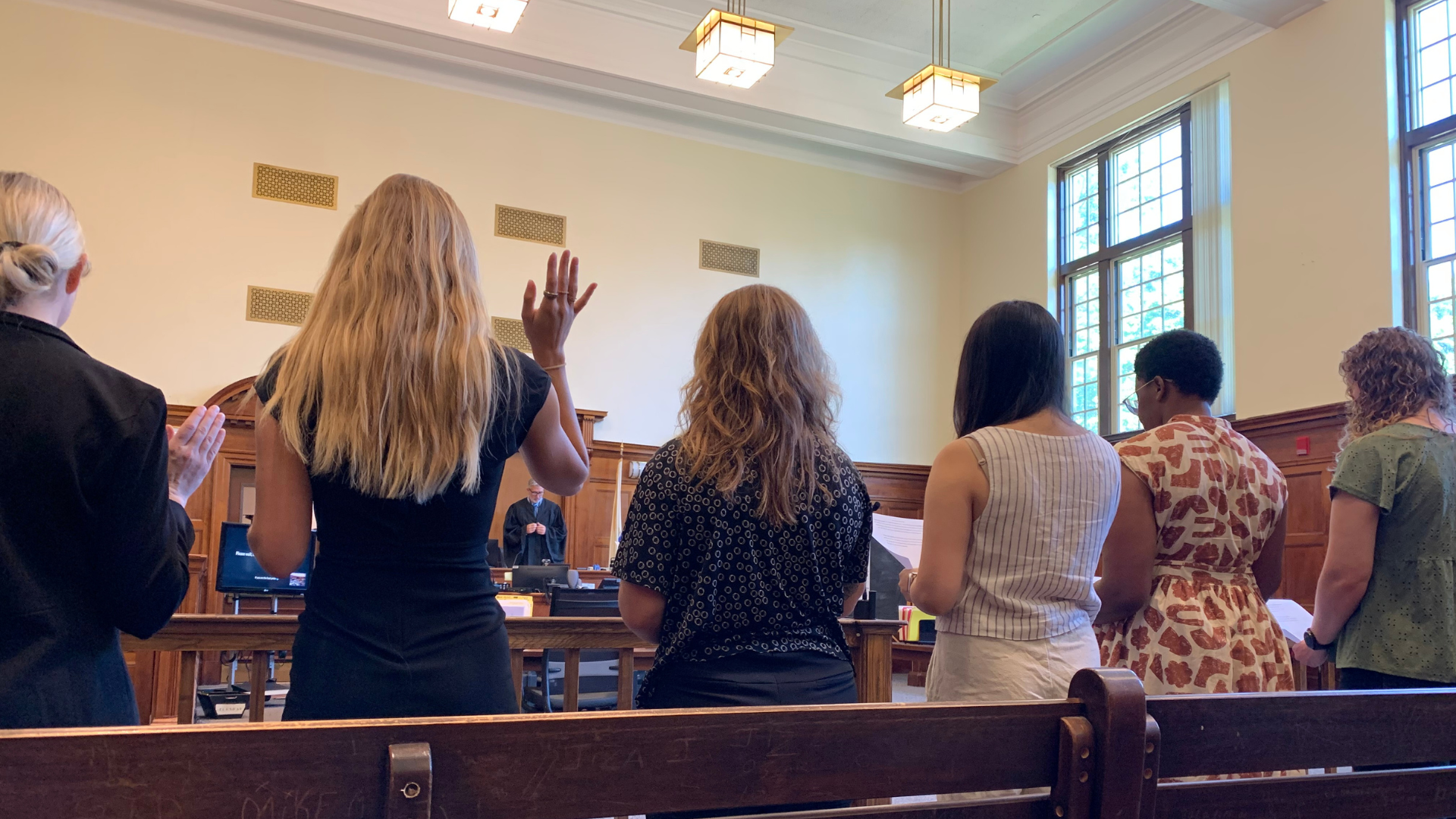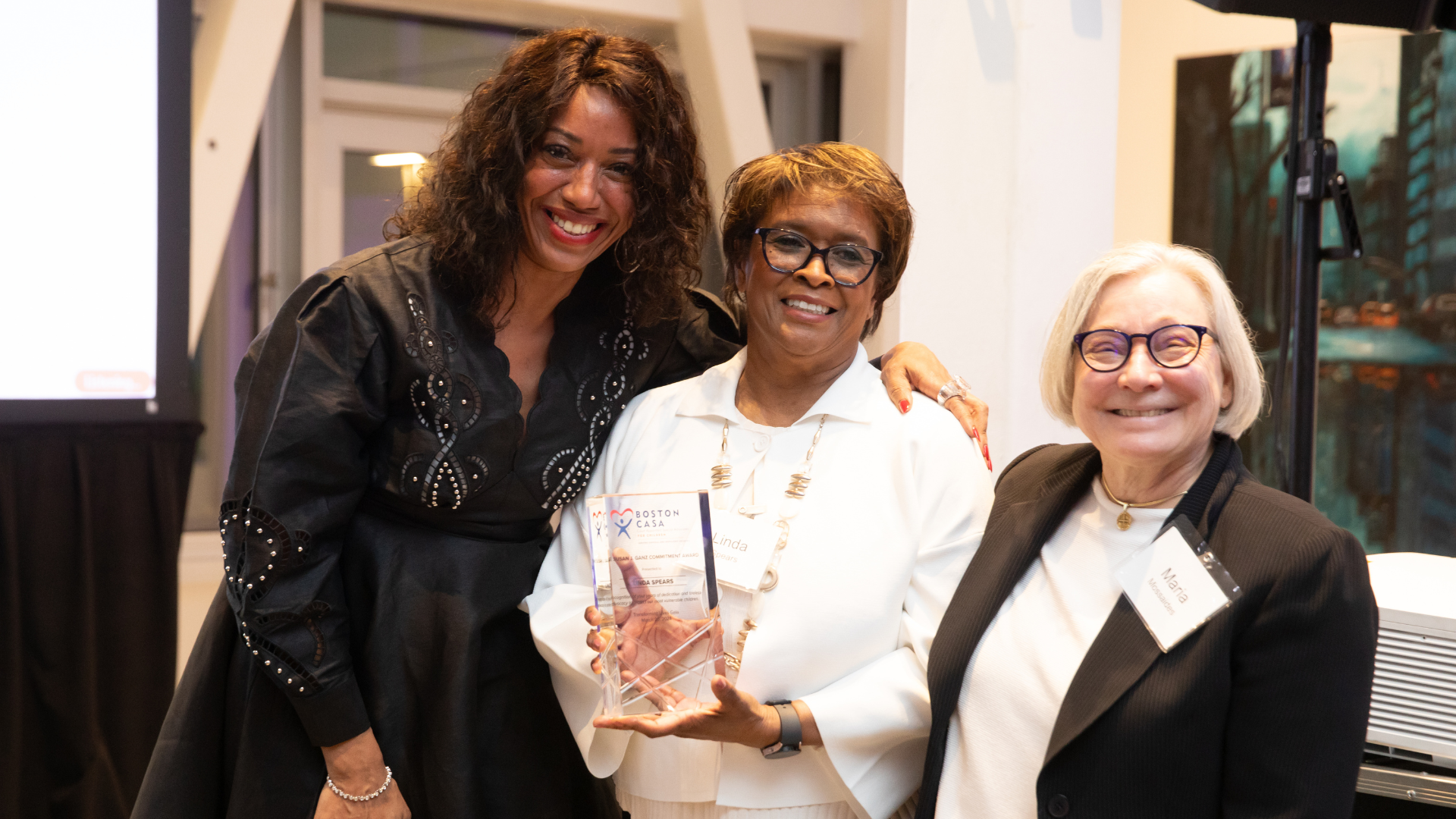*Note: Story contains mention of suicide, abuse, and domestic violence.
After nearly 20 years of working in the Boston school system and in nonprofit leadership, Nicole Stewart looked out across Dorchester’s Franklin Field to where her story began.
Beyond the field sits the Franklin Field Housing Development, what was the Franklin Field Projects when Stewart was a child. It was the proud Bostonian’s first home.
Stewart was thrust into the foster care system at 3 years old, where she would remain until the age of 16. In that time, she lived in six different homes, enduring [abuse], domestic violence, and desperation that led her to attempt suicide for the first time at six years old.
Now, she was the executive director for the Berkshire Partners Blue Hill Boys and Girls Club of Boston.
Hear how a childhood in the foster care system led Nicole Stewart to a life of serving Boston's foster youth:
As she gazed across the field at her starting point, Stewart recalled an overwhelming sense of culmination, purpose, and gratitude.
“I like to call it the pivotal moment in my career that ultimately led me to where I am right now,” Stewart explained. “I was standing there so many years later looking out that window – now the executive director of a major community organization. In that moment, my whole life just flashed before me, and something shifted in me.
“No one, not even me, would have imagined that little girl from the Franklin Field Housing Development could have made it to where I was.”
Today, Stewart serves as the executive director of Boston CASA, a nonprofit serving disadvantaged children and youth in the foster care system who have experienced abuse and neglect.
The organization recruits, trains, and supports volunteer “CASAs” or Court Appointed Special Advocates. Volunteers provide one-on-one care and legally advocate for foster children who would otherwise be lost in the shuffle of an overwhelmed system.

A deep, enduring drive informs Stewart and Boston CASA’s mission to rework circumstances of despair into brighter days instead defined by opportunity. It often begins with the care of just one person, as it did for Stewart.
The only woman she would ever call “mom” became Stewart’s foster parent at age 5.
“She truly changed my life and taught me the value of hard work. She showed me the importance of education and all of that paved the way for me to eventually earn two master's degrees,” Stewart said.
But more than that, she showed me what it meant for a child to have a consistent caring adult in their life, which changed everything for me... I wanted to instill that same value in other children to unlock opportunities for access to good jobs, stable housing, safe neighborhoods, or to live in a safe neighborhood and to help break the cycles of poverty and trauma that I saw and experienced growing up.”
As Stewart’s mom was to her in the midst of a life of instability and isolation, so Boston CASAs are aiming to be for some of New England’s most vulnerable children.
National Foster Youth Initiative research says more than 50% of foster kids will experience homelessness – a stronger probability than graduating high school. 70% will be arrested at least once by age 26. As little as 3% will ever attain a four-year college degree.
“They don’t have a choice of who their parents are and they don’t get to choose the circumstances they’re born into. When they’re removed from their homes, it’s traumatic. They may bounce from foster placement to foster placement and change schools over and over,” Stewart said.
“But this is where Boston CASA can make a really significant difference, and it’s what inspires me to lead this incredible organization. I get a chance to provide for them hope and an opportunity for the brighter futures they deserve.”

A life of isolated chaos makes mistrust of adults a prevailing theme and lingering barrier that CASAs confront every day.
But even when they are met with suspicion or defiance, CASAs are trained and equipped to keep showing up. This, Stewart says, is where change happens.
One such story is about a Boston CASA named Chris, who was paired with a 13-year-old boy just on the other side of being “hot bedded” - meaning he slept in a different foster home every night for 30 straight nights. The child was anxious, despondent, and hardly speaking at all. He was also facing 13 assault and battery charges.
Naturally, he held little trust for anyone he came in contact with. Stewart describes the boy thinking of Chris as “just another adult telling him what to do,” or perhaps even someone who wanted to profit off him. But when he learned that Chris was a volunteer with no motive other than caring, and when Chris refused to stop showing up every day, the walls fell away.
New trust was built through board games, quiet conversations, and laughter. As the boy reentered activities like sports, Chris was always there.
Eventually, Chris was able to work with the boy’s attorney to have all 13 charges dismissed. Barriers were removed for future housing prospects, higher education, and career possibilities. In short, the door to an entirely new future was opened for the child.
“The real work of a CASA is in the everyday things,” Stewart remembers Chris saying of the boy’s transformation. “It’s being the adult who just keeps showing up simply because you care. That’s the heart of CASA.”

The impact is clear.
A wide range of studies, cited by the National CASA//GAL Association for Children, shows that when foster children have a CASA volunteer by their side, they are more likely to find a safe, permanent home, more likely to succeed in school, and are half as likely to reenter the foster care system.
Such stories of redemption, including her own, are what carry Stewart forth in daily confrontation with heartbreaking circumstances – all pointing to the larger truth of a Creator and Father that cares for his children.
“I think God meets everyone where they’re at,” Stewart said of how her faith enables her to continue serving. “If you come to him, I believe that wherever you are, he will respond in kind and answer your prayers in ways that we often can’t see of don’t think of, or it happens five years down the road.”
As part of the national CASA network, Boston CASA is sending out more than 200 volunteers who hold the same heart as Stewart: to change the lives of vulnerable young people by injecting love into them.
To learn more about Boston CASA and the work they’re doing, click here.


